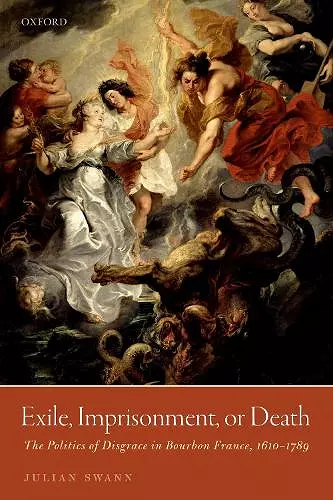Exile, Imprisonment, or Death
The Politics of Disgrace in Bourbon France, 1610-1789
Format:Paperback
Publisher:Oxford University Press
Published:9th Aug '19
Currently unavailable, and unfortunately no date known when it will be back
This paperback is available in another edition too:
- Hardback£140.00(9780198788690)

On the accession of Louis XIII in 1610 following the assassination of his father, the Bourbon dynasty stood on unstable foundations. For all of Henri IV's undoubted achievements, he had left his son a realm that was still prey to the ambitions of an aristocracy that possessed independent military force and was prepared to resort to violence and vendetta in order to defend its interests and honour. To establish his personal authority, Louis XIII was forced to resort to conspiracy and murder, and even then his authority was constantly challenged. Yet a little over a century later, as the reign of Louis XIV drew to a close, such disobedience was impossible. Instead, a simple royal command expressing the sovereign's disgrace was sufficient to compel the most powerful men and women in the kingdom to submit to imprisonment or internal exile without a trial or an opportunity to justify their conduct, abandoning their normal lives, leaving families, careers, offices, and possessions behind in obedience to their sovereign. To explain that transformation, this volume examines the development of this new 'politics of disgrace', why it emerged, how it was conceptualised, the conventions that governed its use, and reactions to it, not only from the perspective of the monarch and his noble subjects, but also the great corporations of the realm and the wider public. Although that new model of disgrace proved remarkably successful, influencing the ideas and actions of the dominant social elites, it was nevertheless contested, and the critique of disgrace connects to the second aim of this work, which is to use shifting attitudes to the practice as a means of investigating the nature of Old Regime political culture and some of the dramatic and profound changes it experienced in the years separating Louis XIII's dramatic seizure of power from the French Revolution.
Julian Swann's reflective and fine study of the political culture of ancien regime France gives us different questions to aks, and more to go on. * Mark Greengrass, Times Literary Supplement *
Exile, Imprisonment or Death has many strengths. It deftly combines political, cultural and intellectual history. It contains numerous case studies that illuminate its perceptive theoretical underpinnings. It reveals much about the workings of Bourbon France in relation to power structures and the complicated yet personal ways in which the political classes negotiated with each other. It is a welcome reminder of the importance of religion, honour and duty to the educated people of Enlightenment France. * Stephen Brogan, Journal of the Liberal International British Group *
This significant scholarly contribution to early modern French history and the political foundations of the French Revolution is most likely to appeal to academic audiences....Highly recommended. * CHOICE *
While only presented as a series of contexts for the study of exile and disgrace, Swann has, in fact, written the best brief and the most authoritative history of the high politics in the last decades of the ancien régime. The major sources on the councils, the court, and the Parlements, both archival and secondary, are woven into the grand narrative constructed by the fiffteen major historians of the period, beginning with Dom Leclercq, whose work on the Regency dates from 1921. Swann takes their best ?ndings and pulls them together, while making judgments that help the critical reader. * Journal of Modern History *
Masterfully traced and analysed Swann's ... study of disgrace is a pleasure to read; it is written with style, clarity, and a touch of humour throughout * H-France *
Julian Swanns latest monograph is a timely contribution... he has managed to identify and explore lucidly so many facets of early modern disgrace, seemingly exhaustively, is in itself laudable. * Adam Horsley, The Seventeenth Century *
[a] well researched, masterful study. Clearly anyone who hopes to understand the dynamics of French court politics and its culture cannot afford to overlook it ... disgrace was central to the politics of the French court during the early modern period. Now it has received its historian. * Thomas E. Kaiser, The Court Historian *
[a] stunning new book ... This book is important, not just because it amounts to the first detailed study of a neglected and important aspect of royal power, but also because it presents an innovative way of looking at politics over the long durée that exposes an entire culture to examination. Previously known as one of the leading revisionist historians of eighteenth-century French politics, Swann now breaks free of the shackles of revisionism to present an utterly fresh and illuminating study of the Ancien Regime political society, which demonstrates why absolute monarchy was unable to achieve serious reform and why so few lamented its passing. * Stuart Carroll, Journal of Early Modern History *
[Swann] has produced an extremely readable volume ... Ancien régime politics were bewilderingly complex, and it is much to this book's credit to make them not just comprehensible but enjoyably dramatic. It will be vital reading for students of ancien régime history at both an undergraduate and a more advanced level. * Ambrogio A. Caiani, History *
This remarkably rich and insightful book will remain an essential read on Bourbon political culture and opens up exciting comparative perspectives wider afield, on the early modern period and beyond. * Giora Sternberg, European History Quarterly *
- Winner of Winner of the 2017 R. Gapper Book Prize for the best book in French Studies.
ISBN: 9780198846062
Dimensions: 234mm x 156mm x 27mm
Weight: 808g
560 pages